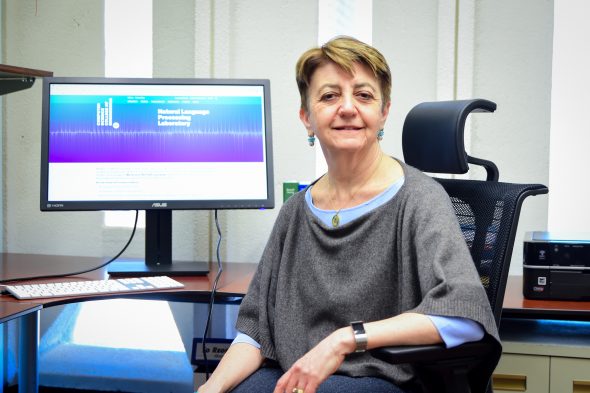Excellence in Teaching: Barbara Di Eugenio
Each year, UIC honors some of its most dedicated and outstanding teachers with the Award for Excellence in Teaching. The winners, who receive a $5,000 salary increase, are selected by past recipients of the award from nominations made by departments and colleges.

Years at UIC: 20
What does it mean to win an Excellence in Teaching Award?
It is an affirmation of my commitment and growth as a teacher over the last 20 years. It is an acknowledgment of the value of the many mentoring activities I undertook over the years, e.g. as a Honors College fellow, as an advisor to many graduate students, as an initiator and supporter of activities to increase the number of women in computer science.
What do you teach?
Computer science — mainly technical electives and graduate courses in artificial intelligence, and a research methods class for Ph.D. students.
How do you engage students in your courses?
I am fortunate that many of my classes address areas of great interest in computer science today. At the same time, I always try to keep students engaged by having them practice in small groups whatever methods I present, so that first, peer-instruction can occur, and second, we can then iron out the details together. Additionally, final class projects focus on scaled-down, actual state-of-the-art applications. And for my own graduate students, constant contact, feedback and mentoring are key. One of my former Ph.D. students in her thesis acknowledgments said: “Throughout all these years, I have always left her office feeling more motivated and happier than when I went in.” I find this to be an incredible compliment, for which I am very grateful.
What do you enjoy most about teaching at UIC?
I truly enjoy the diverse student body at UIC, at both the undergraduate and graduate levels. When I happen to walk on campus just before classes start, I feel the energy of our students and the richness of our campus experience stemming from their many different backgrounds. The thought of being able to make a positive difference in their lives is truly gratifying.
What are your research interests?
I work in Natural Language Processing (NLP) as applied to educational technology, health care, and human-computer interaction in general. This was once a relatively obscure area of research, but NLP is now making a difference in our daily lives — just think about Siri and Alexa.
What is your advice to students considering a teaching career?
The adage, “You don’t know it until you teach it,” is old but ever so true. And, as with any other skill, teaching well doesn’t necessarily come naturally, especially for those who pursue a professorial career after getting a Ph.D. where in general, teaching is not taught; you can certainly improve at it, as long as you are willing to take a critical look at yourself, to take advantage of institutional and other opportunities to learn effective pedagogical strategies, and to ask more experienced colleagues for advice.
